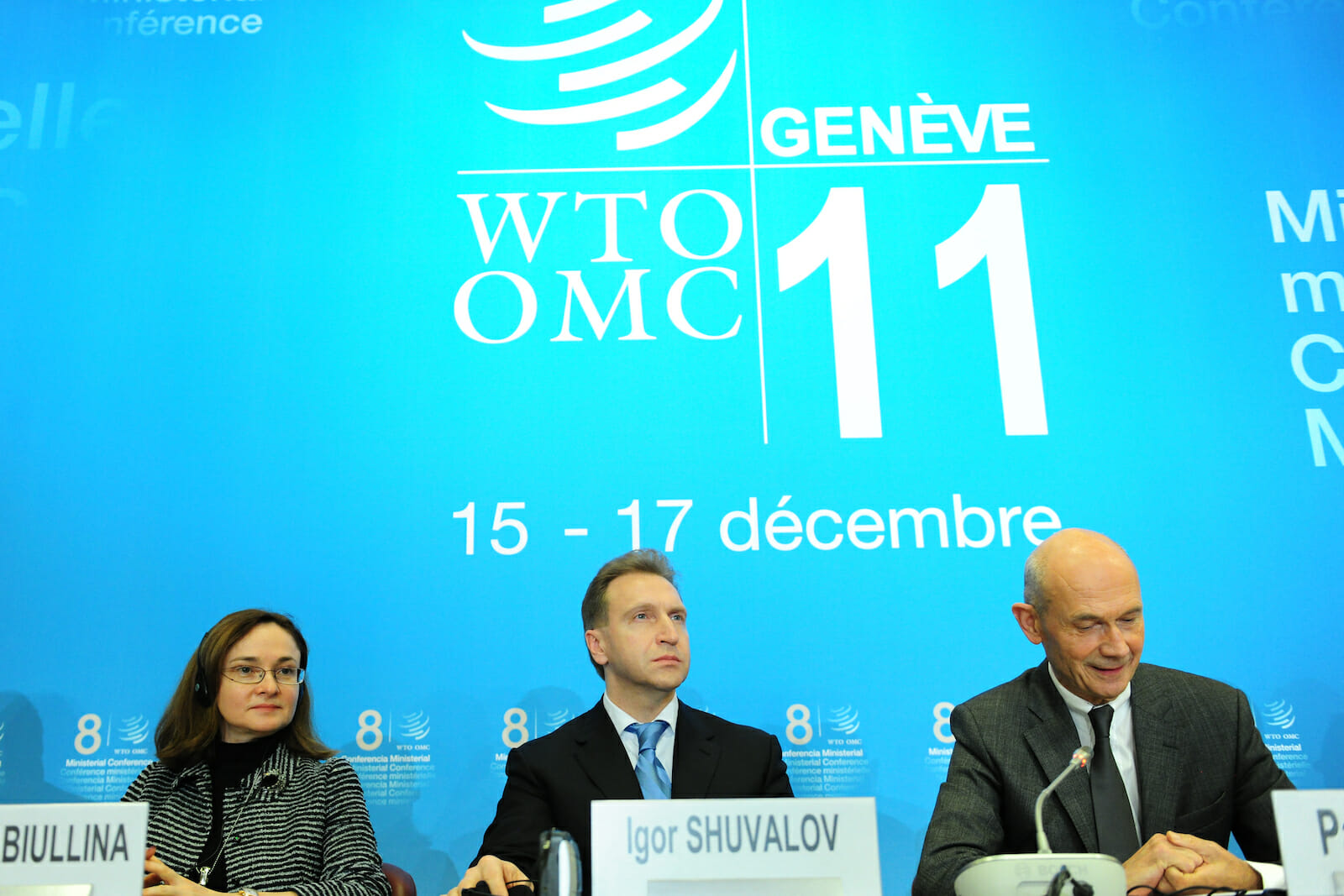
Russia and the WTO: The Politics of Economics
After a nearly two-decade accession process completed, the World Trade Organization has welcomed Russia as a member, pending formal ratification from the Duma that is expected to be completed next June. The Kremlin has been struggling to achieve membership in the WTO since 1993. The process was slowed as interest has been mixed over the past decade under the Putin administration, which desired the growth achieved by China but was reluctant to cede any power to the private sector or foreign interests. The Kremlin’s push to join the organization came as a response to the ailing domestic economy suffering from a lack in foreign investment and falling commodities prices. Coupled with growing discontent with the current administration, Russian leaders seem to understand that a fundamental change is necessary and, with the state of the contemporary global economy, can only be achieved with assistance from without.
As Russia moves forward to join the international community with membership in the WTO, its government leaders continue to rely on the strategies of the past decades to insure the retention of their political power. The protests against the overt fraud and corruption in Russia’s recent parliamentary elections, coupled with the heavy-handed response from the Kremlin and the censorship of social-media, led domestic political-analysts to state that “in Putin’s view, these [protest] leaders need to be frightened, or bought off, or destroyed, or discredited, or threatened with legal measures.” Modernizing Russia has been a long and arduous task that has pitted the government and private sector against each other, undermining the nation’s progress and stability.
Domestic Reforms
Prior to the Soviet Union’s dissolution in 1991, many throughout the world believed the Kremlin would begin to embrace the Western philosophies of parliamentary democracy and regulated free-market capitalism. Manifesting this perception is understandable for, in a bi-polar world, as one power falls it will reform its policies to become more aligned with the other, as a means to achieve stability and security. Many observers expecting this transformation throughout Russia failed to appreciate the scope of the nation’s economic situation, as well as fully recognize the disastrous affects seventy years of authoritarian rule has on a country.
During the transformative 1990s, many politically well-connected industrialists used their connections to not only seize the country’s lucrative resource markets, but also stymie competition from foreign markets. Corruption was rampant as the Kremlin, lacking a central treasury, became reliant upon the oligarch’s ‘authorized’ financial institutions to disperse state funds. Reliance on the oligarchs eventually led to the Russian Financial Crisis in 1998 as GKO bonds were used to cover promissory notes the oligarchs handed out to regional governments, rather than federal monies.
Russia was forced to initiate a series of short-term international loans that eventually devalued its currency and destroyed large segments of the domestic economy. The chaos that resulted from the crisis led many to view the Soviet system – particularly under Brezhnev – as the model for stability; it was not a desire for the return of the Soviet Union, but an aspiration to restore order in a failing system with the only familiar model available.
Putin and the Oligarchs
When Vladimir Putin was elected in 2000, his campaign exploited the nation’s sentiments by idealizing what the Soviet Union was able to do for the population, while reinforcing that “one who does not regret the passing of the Soviet Union has no heart; one who wants to bring it back has no brains.” Soon after ascending to office, he made certain the Russian people were aware of his disdain for the nation’s privatization policies that allowed the oligarchs to take control of the state. Once in office, Putin began unraveling the liberal market reforms many had initially hoped would restore the production sector and increase individual freedoms. The rationale for the reversal in economic policy was outlined in an interview in which he believed that “[b]ack in the 1990s oligarchic groups substituted for government in Russia,” and individuals “were elected to parliament and lobbied laws beneficial for specific financial and industrial groups” instead of “the public[‘s] interest.”
Nationalization policies instituted under Putin were instruments for him to shift economic power back into the hands of the state and – in his words – away from the “people who fuse power and capital.” Since Vladimir Putin ascended to power, there have been two prominent trials that not only exemplified the lengths at which the state is willing to quiet dissent, but also provided observers a better understanding of Russia’s affairs under this administration. The push against the oligarchs began with the prominent Media-Most conglomerate operated by Vladimir Gusinsky. The Kremlin’s focus on Gusinsky increased capital flight and further stagnated what should have been a flourishing economy. After he was stripped of his media operation and forced to flee the country, it became apparent that the country’s oligarchs had a choice of either obeying the Kremlin in all manners or leave.
The Khodorkovsky Trial
Unlike the other oligarchs, Mikhail Khodorkovsky refused both choices which, in 2003, led to his arrest in Siberia. By 30 December 2010, he and his associate’s, Platon Lebedev, second show-trial had ended with each sentenced to a total of fourteen years in prison. The Khodorkovsky trial illustrates the Kremlin’s struggle for power, as well as the Russian people’s fight for democracy and justice.
When the first trial had ended, Khodorkovsky and Lebedev were convicted and sentenced for committing fraud and tax evasion; accusations that were brought by the Kremlin concerning the companies alleged mismanagement of funds from oil sales. The second trial was initiated as both men neared the end of their sentences from the first, but this time the men were accused of stealing the very oil they had failed to pay taxes on in the first trial and selling the product on the black market. The second trial not only undermines the country’s laws regarding double jeopardy, but the second trials entire context also undermines the verdict of the first: how can corporate executives underpay taxes on oil they stole from the company?
The Kremlin publicized the trial against the former Yukos executives as the government taking back the country for the people; however, as the rhetoric from the Kremlin increased, the more it looked totalitarian; government interest rested removing political dissent rather then greed and corruption. For many Russians, the trial of Mikhail Khodorkovsky and Platon Lebedev has defined Putin’s legacy in that the more he emphasized his defense of democracy and justice the less they were willing to believe him.
Abramovich v. Berezovsky
The London trial between two prominent Russian oligarchs – Roman Abramovich and Boris Berezovsky – has become a spectacle as the two former business partners have exposed the inner-workings of Russia’s oligarchs, while battling over the largest personal lawsuit in history, totaling $5 billion USD. The lawsuit is in regard to the rise of the oligarchs in the mid-1990s in which both men were able to take advantage of Russia’s privatization programs. As a small oil-trader, Roman Abramovich initiated a business relationship with Boris Berezovsky – a then confidant of President Boris Yeltsin – that led to his acquiring an oil company and refinery. Abramovich stated that he had paid Berezovsky the monies agreed to when the deal was completed; Berezovsky believes he was entitled to more as a part-stakeholder in the oil company, which means he is entitled to a portion of the company’s profits.
It is not the trial’s intricacies that has captivated so many, but the information that has come out about the oligarchs and their relationships with Russia’s politicians, particularly Vladimir Putin. Vera Chelischeva, a columnist for Novaya Gazeta, has compared the trial to Russia’s WikiLeaks. The trial between the oligarchs not only shows how Russia has been directed and manipulated by a few political and business leaders, but also illustrates the extent of political interference and lack of transparency in Russia’s national institutions; neither Abramovich nor Berezovsky have vocalized their desire to move the trial to Moscow.
The Kremlin and the WTO
Securing the state’s power has been the central focus of the Putin administration, which had led the country’s economic sectors to centralize and double the state’s control over domestic businesses. The success of these policies was dependent upon global commodities prices remaining high, but as recession hit around the world and prices fell Russia has posted its first deficit in a decade. As a response, the Kremlin initiated a series of privatization plans, in non-strategic sectors, that will move the country away from the current Soviet-style command management and, it is hoped, will entice foreign investment.
The Kremlin’s desire to re-brand itself as “economic reformers” stems from its desire to join the WTO. As outlined by Peter Sutherland in Foreign Affairs, “the WTO provides […] a catalyst” for “struggling economies” to “thrive […] in an environment that generates opportunity and supports entrepreneurship”; aspects that will assist Russian businesses in stimulating growth and trade as well as increasing market access, trade, and competition. Not everyone is convinced of the Kremlin’s decision to open the domestic economy to the world. For many in the Kremlin, the process to enter the WTO is seen as a way for the international community to dictate economic policies to the Russian state. Moreover, many government lobbies have stated that time is needed to modernize the agricultural and industrial sectors before they will be able to compete globally.
Putin’s interest in opening the economy to international competition stems from two factors. First, with an educated population leaving the country and collapsing commodities markets, the Kremlin is in need of foreign capital to stabilize its economy. Continuing to reinforce protectionist policies will only further weaken the state’s control and will eventually bring about widespread dissent. Second, with oligarchs continuing to speak out against the Russian government and finance political opposition, Vladimir Putin is gambling that the competition brought about by foreign industries will weaken the oligarch’s power more than his own.
The verdicts in the Khodorkovsky trial have undermined Putin’s rhetoric regarding democracy and justice, while the Roman Abramovich v. Boris Berezovsky court bout has exposed his government for what it really is. Dwindling numbers for the United Russia party in the Duma, coupled with widespread unrest, are cracking the façade carefully sculpted by Putin’s inner-circle. Decrying the shift away from the Brezhnev era will no longer provide Vladimir Putin access to the people’s sympathetic ear, as it did in 2000. Economic reform and privatization policies, under the direction of the WTO, are the only option Putin has in retaining his power; to show the Russian people he is moving away from the system that has dominated the country for the past twelve years.

